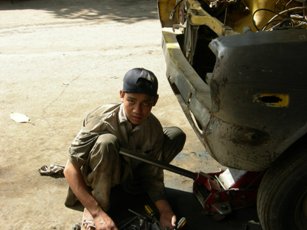 Case study of Muhannad Aaqib- a child labourer working at a motor workshop in Islamabad
Case study of Muhannad Aaqib- a child labourer working at a motor workshop in Islamabad
Ambitious child labourer Muhammad Aaqib, 15, who works at motor workshop, aspires to go back to education
“Though very slow but I am sure that I will be able to make a fortune out of this skill one day,” Aaqib told confidently JDHR’s research team. His father Muhammad Liaquat was a soldier and served in Pakistan Army. His father martyred while serving the Army when Aaqib was 10 and was studying in class 5th.
Aaqib has five siblings (three brothers and two sisters) and mother living with him. Her mother’s income from milk sale of a buffalo and Aaqib’s own daily income of Rs50/- per day out of which he spends Rs15/- per day on transportations are hardly enough to live for a family of seven.
“I have to work for 12 hours a day for just a small amount. But I have to do that as otherwise we cannot survive. I want to go back to school but how can I see my brothers and sisters hungry,” said Aaqib saying, “Poverty and bad luck in terms of death of father have deprived us of childhood feelings”.
Aaqib said he misses his school days as he felt it was enjoyable time free of thoughts of bread earning. He plans to re-continue his studies whenever he would find it appropriate. That is why he is keenly learning the skills of motor mechanic so that he can run his own business to earn more.
“Once I will be a fully trained motor mechanic, it will help me raise my income that may support my brothers and sisters first to continue with their studies and then I will also be willing to get education,” said Aaqib.
Muhammad Aaqib is among those millions of children in Pakistan who are not going to school at school age but are forced to work for survival of themselves and their families. One would subscribe to Aaqib’s point of view that it is not only poverty that plunges children into child labour, but their family conditions and bad luck adds up to this phenomenon. Aaqib testified that though his family was living in poverty with his father’s limited income from the Army job, he used to go to school and not at workplace but it was the bad luck when his father was martyred, he had to leave his education incomplete.
“It is very awful to be an orphan that is forced into labour,” said Aaqib with a gloomy face. He prayed for all working children to complete their education and become honourable citizens.